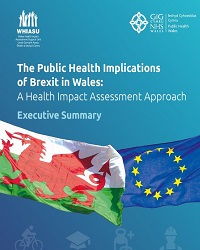Health impact assessment: practical experiences and policies from Wales

WHIASU
Wales illustrated some real-life applications of its approach to health impact assessment (HIA) during a webinar held on 5 March 2020 in which more than 50 members of the Regions for Health Network (RHN) took part.
The Wales Health Impact Assessment Support Unit (WHIASU)
The Gothenburg consensus paper (European Centre for Health Policy, WHO Regional Office for Europe, 1999) defines HIA as “a combination of procedures, methods and tools by which a policy, program or project may be judged as to its potential effects on the health of a population, and the distribution of those effects within the population”. The Wales Health Impact Assessment Support Unit (WHIASU), created in 2004, is tasked with providing training, advice and guidance on how to conduct and use of HIA in Wales. To achieve these goals, WHIASU looks at the wider determinants of health and mental well-being, taking inequality and equity issues into consideration.
WHIASU has developed a training and capacity-building framework for HIA to inform a strategic approach to capacity-building across sectors. The framework, which includes a skills framework, a skills audit tool and a literature review on institutionalizing HIA, identifies 7 HIA roles, enabling involved stakeholders to identify where HIA would be relevant and transferable to their work.
Key messages on how to implement HIA successfully
During the webinar, WHIASU summarized some of the main lessons learned regarding the successful implementation of HIA.
- Conducting HIA requires core transferable skills and knowledge, which many disciplines involved in public services, governance and policy development have.
- HIA implementation needs a collaborative approach: it is important to recognize that a range of people with different roles have contributions to make.
- HIA can be implemented effectively through an approach in which systems and process thinking are embedded into policy making.
- There should be a focus on “learning by doing”.
- Targetting and tailoring capacity-building and training contributes to a more effective and system-wide application of HIA.
- A quality assurance review framework is essential to strengthening focus on accountability and quality in practising HIA.
Practical applications: 2 examples
1. Wales uses HIA to promote an integrated approach to policy making on land-use planning. The active participation of all stakeholders in this exercise enables all sectors to identify and demonstrate their contributions to reducing health inequalities and preventing/mitigating unintended negative impacts of urban-land development.
HIA has influenced policy development and planning by identifying the health impacts, for example, of housing strategies and waste-management, power-generation and road-improvement schemes. As a consequence, it has helped in planning the development of stronger and more coherent approaches to maximizing positive health and well-being outcomes. In addition, HIA has resulted in consideration being paid to potential inequalities and assessment of the possible impacts of specific urban development project on vulnerable population groups in Wales.
2. “The public health implications of Brexit in Wales: a health impact assessment approach – a rapid review and update”, published by WHIASU and Public Health Wales on 11 October 2019, looks at the risks and opportunities of Brexit for the Welsh population and analyses the consequences for:
- families impacted by uncertain/new immigration regulations
- people living in areas with poor economic and health indicators
- people living in areas from which there is a risk that large employers will move
- areas of Wales that are significant beneficiaries of EU funding.
The publication also assesses the potential direct impact of Brexit on working conditions, environmental regulations, supply chains, immigration, access to health-care supplies, and networks.
The review advocates leadership of public bodies across all Brexit issues to provide overall direction to Wales’ response in the short to longer terms. It was very positively received: Wales’ Health Minister referred to it in the Senedd (Welsh Parliament) debate on Brexit on 22nd January 2020.
WHIASU is continuing to advocate the consistent and efficient use of HIA so that resulting evidence-based recommendations on health issues can be taken into consideration in future policy development and planning exercises.



